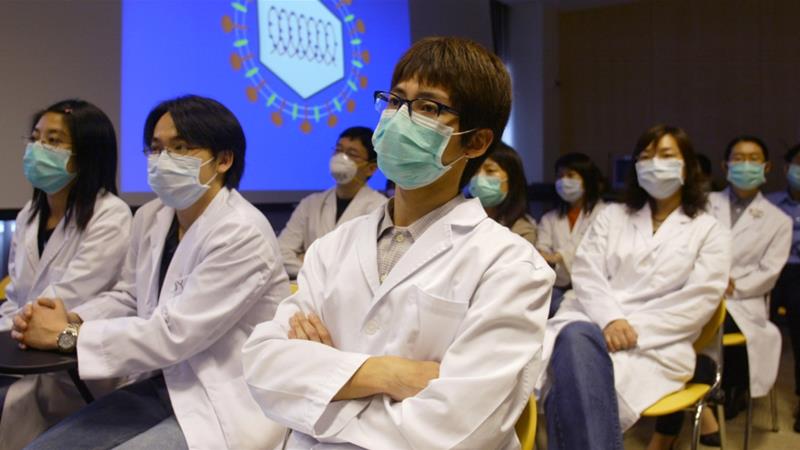U.S. Senator Doug Jones of Alabama Urges Everyone To Remain At Home –
By Glynn Wilson –
PENSACOLA, Fla. — Disregard everything posted on social media prior to Monday, March 16.
Ignore any postings about a vaccine becoming available in time to deal with the coronavirus COVID-19 global pandemic.
Remain at home if at all possible, and don’t seek testing for the virus unless you know you have been exposed to a person who has already tested positive or have symptoms yourself.
These are the latest recommendations from federal and state officials who have now finally stopped listening to President Donald Trump’s gut and have begun to put out accurate information, including U.S. Senator Doug Jones of Alabama, the Democrat from Birmingham.
“People on Facebook and Twitter should ignore everything that the president of the United States said before yesterday (Monday),” Senator Jones said in a media conference call with news reporters on Tuesday morning. “Just ignore it. Everything. Watch what he said yesterday, and listen to what he said. He was talking about people staying home … don’t get a test until you get sick.
“It’s what the health care professionals have been saying now for a couple of weeks,” he said. “Yesterday was the first time we’ve seen a seriousness, accurate information” coming out of the White House.
Sweeping new federal recommendations announced from the White House on Monday urging Americans to sharply limit their social and work related activities appeared to be drawn from a dire scientific report put together by a team of British researchers warning that 2.2 million people in the United States could die over the next 18 months without immediate actions by the government and individuals to slow the spread of COVID-19 and suppress new cases, according to the New York Times and other news outlets.
“To curb the epidemic, there would need to be drastic restrictions on work, school and social gatherings for periods of time until a vaccine was available, which could take 18 months,” according to the report, which cautioned that such steps carried “enormous costs that could also affect people’s health,” but concluded they were “the only viable strategy at the current time.”
Public Trust
As of March 13-14, Americans had little trust in the information they were hearing from President Trump about the novel coronavirus, and their confidence in the federal government’s response was declining sharply, according to an NPR/PBS NewsHour/Marist poll.
Only 37 percent of Americans were saying they had a good amount or a great deal of trust in what they were hearing from the president, while 60 percent said they had not very much or no trust at all in what he was saying. Just 46 percent of Americans said the federal government was doing enough to prevent the spread of the coronavirus, down from 61 percent in February.
After Monday’s news conference in Washington, White House recommendations changed and the administration began urging Americans to work from home, avoid unnecessary shopping trips and refrain from eating out in bars and restaurants. Some states and cities have already imposed stricter measures, including lockdowns and business closings.
Asked at a news conference with Trump about what had led to the change in thinking by a White House task force, Dr. Deborah Birx, one of the task force leaders, said new information had come from a model developed in Britain.
“What had the biggest impact in the model is social distancing, small groups, not going in public in large groups,” Dr. Birx said. “The most important thing was if one person in the household became infected, the whole household self-quarantined for 14 days. Because that stops 100 percent of the transmission outside of the household.”
Senator Jones said we are all undergoing “stressful times.”
“But we are all going to get through this together,” he said.
The Senate is back in Session this week working on economic stimulus packages, including one for $850 billion that could include direct payments to every American for perhaps $4500, according to the Washington Post and other news outlets.
“We’re looking at sending checks to Americans immediately,” Treasury Secretary Steve Mnuchin said Tuesday at a news briefing. “And I mean, now in the next two weeks.”
The White House’s support of this idea, which has won backing from Democrats and some Republicans in Congress, shows how fast talks are evolving, according to the Post. President Trump had initially supported a payroll tax holiday, but said Tuesday that would take too long to deliver relief to Americans.
“Payroll tax is one way, but it does come over a period of months, many months,” Trump said. “And we want to do something much faster than that. So I think we have ways of getting money out pretty quickly and very accurately.”
A Difficult Situation
“It is not the be all, end all,” Senator Jones said.
“This is a difficult situation, and I believe things are going to get more difficult. We are in an unprecedented situation in the country and the world. This will be a huge financial stressor, but it won’t break us. I am confident in our ability to rise above our adversities, to rise to the occasion and stem the tide, as long as everyone does their part.”
He and the Senate are working on a plan to get the costs of all the tests for those who need them covered, even for people without health care coverage. They are working on a bill to get moving on work toward developing a vaccine, but that is months away, Jones said.
He said it was important to “strongly consider” monthly financial assistance to “working families during this emergency period, and by that I mean a United States Treasury Check,” not paid leave or “anything like that.”
He also wants to see childcare assistance for health care workers, and delaying tax filing deadlines from April until August without any interest or penalties. He urged those expecting a refund to go ahead and file, while the deadline could be extended for those who will have to pay. He also wants to see stricter rules against price gauging, especially on essential items like hand sanitizors.
March 31 Runoff
Senator Jones also thinks it’s a “good idea” to postpone the March 31 Republican primary runoff vote for Senate, which pits his two possible opponents against each other, former Senator and Attorney General Jeff Sessions and former Auburn football coach Tommy Tuberville. The Republicans in Alabama have floated a trial balloon on doing that, although no announcement on a final decision has been released as of this writing.
“I think that’s a good idea to consider,” he said.
It would be a good opportunity to look at what’s going on around the country and considering good ideas like early voting, voting by mail, and better ways to do absentee ballots.
“It’s time that Alabama start moving into that situation,” he said. “We register a lot of people in Alabama, but we don’t always give them good access to the ballot box. We need to be looking at ways to make it easier to get more people to be able to vote and participate in this democracy that we call America.”
Other Issues
Addressing other issues, Senator Jones said he’s had reports of long lines at drive-through virus testing stations in Jefferson County, mainly because people who are not sick are trying to get tested. He also said there is still a shortage in the state of the swabs to conduct the tests.
“Tests are few and far between right now,” he said. “We are getting more … but unless you are really sick, hold back.”
He said people are asking what they can do to help, and he indicated the best thing everyone can do, to do their part, is “simply to stay home. Unless you’ve got to go out, please consider just staying at home. The spread of this virus is through human contact. We want to do everything we can to blunt the spread.”
He indicated the crisis will go on for months, not just weeks.
“This is a non-partisan issue,” he said. “We are all going to get through this together.”
In response to reporter’s questions, he said it would be a good idea for state officials to begin looking at reopening some of the 18 rural hospitals that have been closed due to the lack of Medicaid expansion in Alabama to take care of the expected rise in patients as the virus spreads.
“Everything is on the table right now,” Jones said.
The state’s largest hospital at UAB in Birmingham is already at 90 percent capacity, without COVID-19 patents, he said, and the state is going to need more beds before this pandemic runs its course.
He indicated that while there still may be partisan differences on where and how money should be spent, he anticipates a non-partisan coming together in Washington.
“We don’t want to get into another Great Recession or depression,” he said. “This has the potential to be much more severe than 2008.”
Confusion on Facebook
Addressing some confusion going around on Facebook about supposedly free testing for everybody and the availability of a vaccine, he said anyone with insurance should be able to get a test at some point with no costs or copays, and the Senate and Congress are working on plans to get everyone covered, even those on Medicaid and people with no health care coverage at all. But that is not the case yet.
“The problem we have now is that the tests are simply not available,” he said.
People in the public and private sector are working to get more testing equipment available, he said. His staff was in conversations with state officials Tuesday morning, and they are being told the state is running low on swabs to conduct the tests. There is also a shortage of protective equipment for health care workers, ventilators, respirators, etc.
“We need to make sure that our health care system is not overburdened and that those people who are getting into that system are the ones who need it the most,” he said. “We’ve got to make sure that we do the right thing for the people who are most vulnerable, the ones that are the sickest.”
As for the vaccine, he said, “People should not plan on a vaccine anytime soon.”
The first trials just started this week, he said. “Vaccines are months if not a year away. If we are still in a pandemic we are in deeper trouble. It’s not going to help us right now.”
After Friday’s declarations of a national emergency in Washington and a state of emergency in Alabama, information began to flow from the Republican government in Alabama. According to the state health department, there have now been 36 confirmed cases of coronavirus in the state, although no deaths are being reported at this time.
The state added a county by county list of cases on its website.
Florida now has a graphical dashboard interface.
According to the latest news from the Florida Health Department, as of 10 a.m. Tuesday there are 192 total confirmed cases of the virus in Florida cases. The latest person to die from the virus was a patient in a Broward County Assisted Living Facility. There have so far been 173 positive cases confirmed among Florida residents, with 19 positive cases in non-Florida residents, and six deaths in the state.















WHERE is the testing? What happened to the vulture capitalist “captains of industry” stepping forward and assisting “the people” as DJT promised at more than one press conference-here’s an idea, as apparently waiting on Big Pharma to help/assist anybody will cost unnecessary lives-activate “war powers” and force these folks to go into production overdrive??? Help from Washington-like Santa and the Easter bunny?